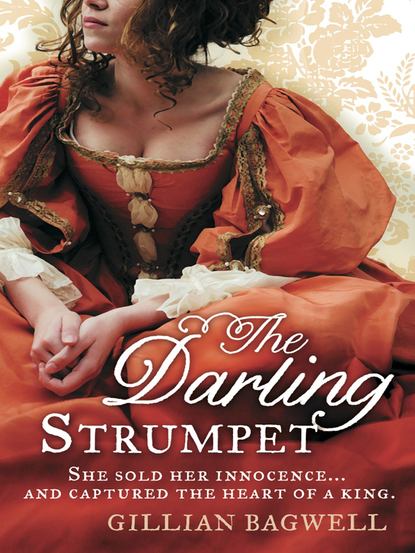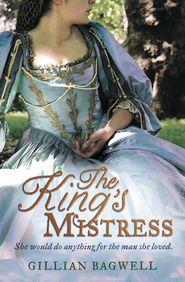По всем вопросам обращайтесь на: info@litportal.ru
(©) 2003-2025.
✖
The Darling Strumpet
Настройки чтения
Размер шрифта
Высота строк
Поля
“Harry’s got a way for me to get out of Madam Ross’s!” she said. “When the playhouse opens, there will be need of two wenches to sell oranges and sweetmeats. Harry says he can get me one of the situations, and you can have the other, if you want it.”
“When do we start?”
“Not ’til May,” Rose laughed. “And Orange Moll has to give us the nod.”
“Who’s she?”
“Mary Meggs is her proper name. She holds the licence to sell fruits and nuts and such. But Harry says he’ll make it all come right.”
NELL STOLE A QUICK LOOK AT ROBBIE THAT NIGHT AS HE ATE. “ROBBIE,” she said, “Rose has got me and her work at the playhouse. Selling oranges and so on.”
“You have no need of work.”
“But I could earn my keep. And perhaps I’d meet gentlemen who would want to do business with you.”
Robbie snorted. “Who would want to do business with you, more like.”
Nell held her tongue. First she had to meet Orange Moll. If all went well and the job was hers—well, she’d cross that bridge when she came to it.
A FEW DAYS LATER, SHE AND ROSE PRESENTED THEMSELVES AT WILL’S, the fashionable coffeehouse in Russell Street at Covent Garden, to be inspected by the formidable Orange Moll. Harry was there with her, lounging against the bar. Nell surmised he must have made some impudent remark, for he roared with laughter, while Moll struggled to assume a look of dignified disapproval rather than the chuckle of flattered amusement that threatened to erupt.
Harry hailed the girls, and Moll turned to look at them. She was very round, billowing over the stool on which she sat, her capacious bosom overflowing the low neckline of her dress. Nell noted the shrewd evaluation in the quick glance. She felt like a heifer at Smithfield Market, but could tell that Moll was pleased with what she saw.
“Aye,” Moll said. “They’re comely-looked wenches, both of them. I’ll warrant you’ve been peddling more than oysters, have you not?”
Before Nell could think how to respond, Rose, at an almost imperceptible nod from Harry, looked Orange Moll straight in the eye, and said, “Yes, ma’am. I’m at Madam Ross’s. And Nell was lately, too.”
“Well, that’s all to the good,” said Moll. “A pretty mab who know how to catch a gentleman’s eye, and how to jest and flirt, will sell far more than a prim stick who thinks herself above it. Very well, we’ll give you a try. The plays begin at three. You’ll work from noon until the show is over and the folk have gone. Oranges are sixpence, and a ha’penny of that’s yours to keep.” She gave the girls a knowing smile.
“And there’s more of the ready to be made, for a girl who has her eyes open and her wits about her. Now. Have you ever et an orange? No? Well, here’s your first, then.”
She gave Nell and Rose each an orange and showed them how to peel off the dappled skin to get at the pulp beneath. Nell inhaled the pungent scent and bit into a segment. The sweet tang of the juice was wonderful, different from anything she had tasted.
“Sweet Seville oranges,” said Moll. “All the way from Spain, where it’s warmer.”
The golden oranges, like little suns, conjured in Nell’s mind images of a sultry land of constant languorous summer.
ROBBIE LOOKED GRIM WHEN NELL MENTIONED THE PLAYHOUSE AGAIN that night as they lay in bed. She had been bursting all day with the anxiety of talking to him and the fear of what he would say.
“Let me try it,” she begged. “You’ll see, no ill will come.”
“You may try it for a week,” he said finally. “But I don’t like it a whit. And if you come to any mischance in that time, you’ll stop, and no argument.” He turned his back to her and pulled the covers over his head, and Nell reckoned she had best leave it at that.
THE NIGHT BEFORE SHE WAS TO BEGIN AT THE PLAYHOUSE, NELL’S head was too full of thoughts of the next day for sleep to come. Robbie snored softly next to her in the dark. She slipped out of bed and padded to the window. The moon hung low and bright in the warm night sky. She regarded the stars in wonder. So many of them. She recognised some patterns that she knew—the Great Bear, the Small Bear, the Hen and Chickens—and wondered how many people had looked up at that same moon and stars since time began.
A watchman passed below, crying out, “Two o’clock of a fair, clear night, and all is well.” All was well. Whatever the next day might bring, it must be good. The stars stood guard over her fortunes. And maybe somewhere, too, her father watched.
IN THE MORNING NELL DRESSED IN THE BEST CLOTHES SHE HAD, A skirt and body in russet. She had washed her shift and it peeped out clean and white at her elbows and neckline. She took out her precious ribbon knot of blue and gold from the small box under the bed where she kept her few treasures—the shard of mirror; her little doll; a silk handkerchief left behind in her room at Madam Ross’s by some man; a pink rose she had plucked and hung upside down by a thread to dry, its papery petals giving off a sweet scent, like memories of another day.
Rose arrived, flushed and smiling, her brown curls and blue eyes set off by a saffron-coloured gown. As soon as she knew she had work at the playhouse, she had left Madam Ross’s and moved into a room above the nearby Cat and Fiddle Tavern, and she looked happier than Nell remembered seeing her.
It wasn’t far to the playhouse, but as Rose and Nell stepped into Bridges Street, the familiar thoroughfare seemed altogether different. A parade of fine carriages choked the way, and Nell realised with a start that their destination must be the theatre. She had not thought about so many people going to hear the play. But it stood to reason that everyone would want to be present for the first performance at the fine new Theatre Royal. And she would be a part of it! She felt a thrill, and then a stab of doubt. What made her so sure of herself? Maybe Moll would decide that she had made a mistake, that she wanted someone older, taller, fairer. Someone better. After all, who was she but a ragamuffin from the squalid streets?
Вы ознакомились с фрагментом книги.
Приобретайте полный текст книги у нашего партнера:
Приобретайте полный текст книги у нашего партнера:






